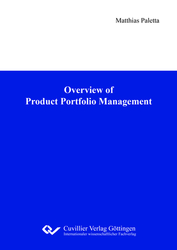| Departments | |
|---|---|
| Book Series (97) |
1382
|
| Nachhaltigkeit |
3
|
| Gesundheitswesen |
1
|
| Humanities |
2372
|
| Medienwissenschaften | 16 |
| Theology | 57 |
| Philosophy | 102 |
| Law | 423 |
| Economics | 853 |
| Social sciences | 417 |
| Sports science | 48 |
| Psychology | 233 |
| Educational science | 190 |
| History | 183 |
| Art | 111 |
| Cultural studies | 166 |
| Literary studies | 117 |
| Linguistics | 89 |
| Natural Sciences |
5408
|
| Engineering |
1798
|
| Common |
98
|
|
Leitlinien Unfallchirurgie
5. Auflage bestellen |
|
Advanced Search
Overview of Product Portfolio Management (English shop)
Matthias Paletta (Author)Preview
Extract, PDF (610 KB)
Table of Contents, PDF (580 KB)
Portfolio management in general is a widely spread and highly accepted topic in the management literature and in practice. Its origins go back to Markowitz and the early 1950s focussing financial assets. Soon, this concept was broadly applied to multiple economic disciplines such as strategic management, marketing, product management, resource management, real estate management, innovation management and many more. Due to this vast proliferation it appears to be useful to review the portfolio management literature comprehensively and to provide an overview of the current status. One major difference of portfolio management approaches is the focus on the analysis on the one hand side and the managerial process on the other hand side. Another important differentiation dimension is the object of investigation – strategic business units/corporate investments versus individual products.
Two prominent representatives of portfolio management tools – analysis-focussed McKinsey Matrix and process-focussed New Product Development by Cooper – are described and evaluated in more detail to highlight pros and cons and to show limitations in practical usage.
| ISBN-13 (eBook) | 9783736989450 |
| Language | English |
| Page Number | 28 |
| Edition | 1. |
| Publication Place | Göttingen |
| Publication Date | 2019-02-18 |
| General Categorization | Non-Fiction |
| Departments |
Economics
|
| Keywords | Portfolio Management, Product Portfolio Management, New Product Development Process, General Electric / McKinsey Approach, GE/McKinsey Business Screen, Strategic Management, Management of Strategic Business Units |








